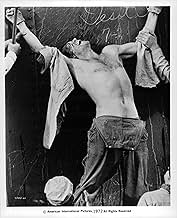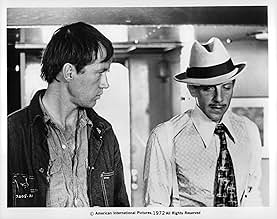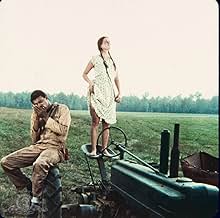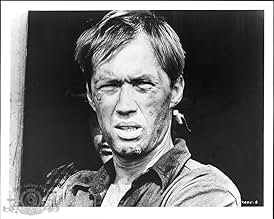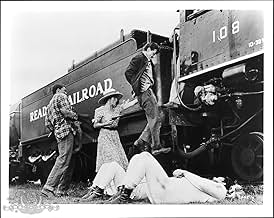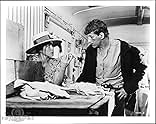PUNTUACIÓN EN IMDb
6,0/10
12 mil
TU PUNTUACIÓN
Durante la Gran Depresión, un líder sindical y una joven se convierten en delincuentes para vengarse de la compañía de ferrocarriles.Durante la Gran Depresión, un líder sindical y una joven se convierten en delincuentes para vengarse de la compañía de ferrocarriles.Durante la Gran Depresión, un líder sindical y una joven se convierten en delincuentes para vengarse de la compañía de ferrocarriles.
- Dirección
- Guión
- Reparto principal
- Premios
- 1 nominación en total
David Osterhout
- McIver #2
- (as David R. Osterhout)
Grahame Pratt
- Emeric Pressburger
- (crédito solo)
'Chicken' Holleman
- M. Powell
- (crédito solo)
Harry Northup
- Harvey Hall
- (as Harry Northrup)
Jerry Cortez
- Sheriff
- (sin acreditar)
Louie Elias
- Boxcar Tough
- (sin acreditar)
Michael Fitzgerald
- Apple Peeler
- (sin acreditar)
Gerald Raines
- Train Engineer
- (sin acreditar)
Gayne Rescher
- Brothel Client
- (sin acreditar)
Reseñas destacadas
This was Martin Scorsese's second full-length feature film and it is a decent one. It's about a young girl in the 1930's who meets and falls in love with a union organizer, who also happens to be a thief. Together, they form a small gang and begin robbing trains as well as anything else they can get their hands on. The fun soon turns to fright when they become fugitives and are hunted down by law enforcement officers. There's action and entertainment but not a movie that you would expect from Martin Scorsese. It has none of his trade marks whatsoever. But do realize that this was one of his first films and try to respect that. I do.
Scorsese refers to this 1972 Roger Corman quickie--he shot it in the deep South in twenty-one days--as his "exploitation picture." Funny, that--if it came out today, it'd be the height of the Arty Independent Film. Barbara Hershey and David Carradine are this movie's knockoff of Bonnie and Clyde; the script ain't much, but Scorsese storyboarded every shot and hoo doggie! This guy was the greatest shotmaker ever, even when he was on Skid Row. Rent it for Hershey's lyrical style and the chance to discern the fetus of a genius.
Rumor has it Martin Scorsese showed this film, his second, to John Cassavetes, who labeled the movie "sh*t" and suggested Marty work on more personal projects in the future. This advice prompted Scorsese to direct Mean Streets, the first of his many masterpieces. Boxcar Bertha is not one of them, but it isn't as bad as Cassavetes stated, either. It's an average B-movie of the kind Roger Corman would offer to his students (Marty among them).
Plotwise this picture has a more defined structure than Who's That Knocking at My Door: the setting is small-town America, the Great Depression is far from over, and a young girl named Bertha (Barbara Hershey) joins union leader "Big Bill" (David Carradine) in a violent protest against the people who are managing a railroad. When things turn ugly, the two lovers are forced to run for their lives, while still hoping they will prevail.
Hardly an original story (it's essentially the poor man's Bonnie & Clyde), but Scorsese does his best in making it appealing to audiences, shooting in beautiful countryside locations and obtaining strong performances from Hershey (who would later play Mary Magdalene in The Last Temptation of Christ) and Carradine, most notably in a sex scene that, according to everyone involved, was not faked.
Beyond that, though, it is obvious Cassavetes had a point: there is nothing that gives Boxcar Bertha that unique Scorsese feel. He just did his job without finding anything in the script he could connect to; even the religious iconography used in the bloody climax seems to have been tucked in for no particular reason.
Still, the film is enjoyable and worth seeing, even just as the product of a young filmmaker still shaping into the master he was to become.
Plotwise this picture has a more defined structure than Who's That Knocking at My Door: the setting is small-town America, the Great Depression is far from over, and a young girl named Bertha (Barbara Hershey) joins union leader "Big Bill" (David Carradine) in a violent protest against the people who are managing a railroad. When things turn ugly, the two lovers are forced to run for their lives, while still hoping they will prevail.
Hardly an original story (it's essentially the poor man's Bonnie & Clyde), but Scorsese does his best in making it appealing to audiences, shooting in beautiful countryside locations and obtaining strong performances from Hershey (who would later play Mary Magdalene in The Last Temptation of Christ) and Carradine, most notably in a sex scene that, according to everyone involved, was not faked.
Beyond that, though, it is obvious Cassavetes had a point: there is nothing that gives Boxcar Bertha that unique Scorsese feel. He just did his job without finding anything in the script he could connect to; even the religious iconography used in the bloody climax seems to have been tucked in for no particular reason.
Still, the film is enjoyable and worth seeing, even just as the product of a young filmmaker still shaping into the master he was to become.
Early, solid film from Scorcese with Hershey as the heroine, who along with Carradine leads a pack of hoods who begin as communists and progress to bigger and bigger crimes -- something of a variation on Corman's "Machine Gun Kelly." Carradine and Hershey give good, but not outstanding, performances. The direction is somewhat showy and involves a lot of movement, typical of Scorcese's more evolved style as well. Roughly follows the mold set by previous AIP gangster mama flicks, with the step up on the violence meter each succeeding film seemed to demand.
Interesting also that this is the only Corman/AIP collaboration I can remember seeing from this period of time (72) when Corman's independent operations were becoming more successful all the time (w/ the nurse movies and stewardess epics cleaning up at the box office). I can only think that they saw it as a continuation of such a successful collaboration that it was impossible to resist getting together again one more time (though Corman claims to have been so absolutely disgusted by their treatment of his epic "Gasssssss" that he would no longer work with them after 1970). Anyone with information on how this collaboration took place will make me very grateful by forwarding this information to me.
Interesting also that this is the only Corman/AIP collaboration I can remember seeing from this period of time (72) when Corman's independent operations were becoming more successful all the time (w/ the nurse movies and stewardess epics cleaning up at the box office). I can only think that they saw it as a continuation of such a successful collaboration that it was impossible to resist getting together again one more time (though Corman claims to have been so absolutely disgusted by their treatment of his epic "Gasssssss" that he would no longer work with them after 1970). Anyone with information on how this collaboration took place will make me very grateful by forwarding this information to me.
Boxcar Bertha is a fine film and entertaining at times. It supposedly tells a "true story" but I doubt we can be expected to believe every word of it. Nor should we. This is clearly the "fictionalization" version.
All the same; that doesn't make it any better. There are some good scenes here and there and a few good lines and one or two great stunts and effects.
But at the end of the day it has to be s pass for me. Not Scorsese at his best, but does show him as an up and coming director as he developed his style. So for that reason it can be counted as a historical record but nothing more.
All the same; that doesn't make it any better. There are some good scenes here and there and a few good lines and one or two great stunts and effects.
But at the end of the day it has to be s pass for me. Not Scorsese at his best, but does show him as an up and coming director as he developed his style. So for that reason it can be counted as a historical record but nothing more.
What Scorsese Film Ranks Highest on IMDb?
What Scorsese Film Ranks Highest on IMDb?
Cinema legend Martin Scorsese has directed some of the most acclaimed films of all time. See how IMDb users rank all of his feature films as director.
¿Sabías que...?
- CuriosidadesAfter he finished this film, Martin Scorsese screened it for John Cassavetes. Cassavetes, after seeing it, hugged Scorsese and said, "Marty, you've just spent a whole year of your life making a piece of shit. It's a good picture, but you're better than the people who make this kind of movie. Don't get hooked into the exploitation market, just try and do something different." Scorsese's next film was Malas calles (1973).
- PifiasThe currency shown in the film is all modern, post 1960s, with modern banking money bands.
- Citas
Boxcar Bertha: Pay no attention to that man behind the curtain.
- Créditos adicionalesOpening Statement: The following events are adapted from the true experiences of Boxcar Bertha Thompson, as related in the book "Sister of the Road"
- Versiones alternativasThe restored 2020 version added a 12 seconds shot introducing the party around the 58th minute.
- ConexionesFeatured in Directores de cine: The Films of Roger Corman (1999)
Selecciones populares
Inicia sesión para calificar y añadir a tu lista para recibir recomendaciones personalizadas
- How long is Boxcar Bertha?Con tecnología de Alexa
Detalles
Taquilla
- Presupuesto
- 600.000 US$ (estimación)
- Recaudación en todo el mundo
- 6443 US$
- Duración
- 1h 28min(88 min)
- Color
- Relación de aspecto
- 1.85 : 1
Contribuir a esta página
Sugerir un cambio o añadir el contenido que falta



